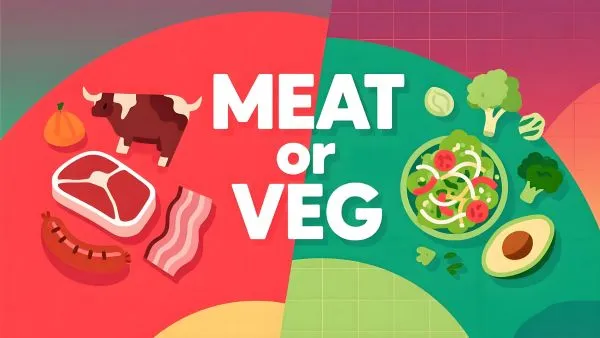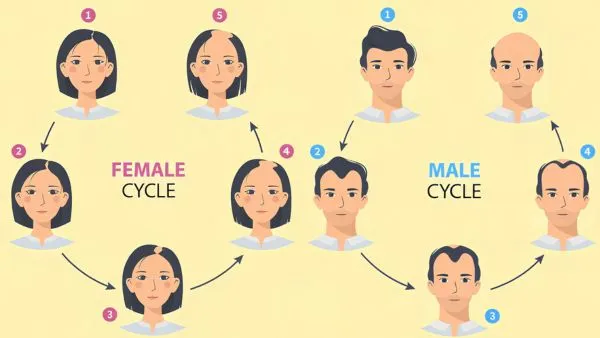
Am I a Vegan, Vegetarian, or Meat-eater?
Vegetarianism isn't just a diet; it's a choice shaped by taste, values, and daily habits. Some people avoid meat entirely, finding joy in the vibrant flavors of plants, while others dip their toes in, skipping meat most days but not strictly. But what makes someone a committed vegetarian? It's more than just saying, "I don't eat steak"; it's about consistency, intent, and how food choices weave into daily life.
1. What's your favorite type of restaurant?

2. How often do you eat meat in a week?

3. How do you feel about the taste of meat?

4. What's your opinion on plant - based meat substitutes?

5. How do you react when you're served a vegetarian meal at a friend's house?

6. What's your favorite meal of the day, and what does it typically include?

There are various dietary habits, including carnivorism and vegetarianism. Everyone is pursuing a healthy diet and finding the right dietary habits for themselves.
The Carnism
Meat has been a staple in many cultures, providing essential nutrients such as protein, iron, zinc, and vitamin B12. It has played a significant role in human evolution, as the consumption of meat is believed to have contributed to the development of larger brains.
In many societies, meat is not just a food source but also holds cultural and symbolic value. For example, in some celebrations and festivals, a roasted turkey or a juicy steak is the centerpiece of the meal, representing abundance and prosperity.
The Vegetarianism
On the other hand, vegetarianism, which involves avoiding meat and sometimes other animal products, has a rich history dating back to ancient times. Philosophers like Pythagoras advocated for a vegetarian diet, believing in the transmigration of souls and the idea that harming animals is unethical. In modern times, the reasons for choosing vegetarianism have expanded. Many people adopt this lifestyle out of concern for animal welfare, opposing the inhumane treatment of animals in factory farms. They believe that animals have the right to live free from suffering and that raising them for food causes unnecessary pain.
Environmental Factors
Environmental factors also play a crucial role in the decision to become vegetarian. Livestock farming is a major contributor to greenhouse gas emissions, deforestation, and water pollution. The production of meat requires large amounts of land, water, and energy. For instance, it takes far more water to produce a pound of beef than it does to grow a pound of vegetables. As climate change becomes an increasingly pressing issue, more individuals are turning to vegetarianism as a way to reduce their carbon footprint.
Health Factors
Health is another key consideration. Studies have shown that a well-planned vegetarian diet can offer numerous health benefits, such as reducing the risk of heart disease, high blood pressure, type 2 diabetes, and certain types of cancer. Vegetarian diets are often rich in fiber, vitamins, minerals, and antioxidants, which are essential for maintaining good health. However, it's important to note that a poorly planned vegetarian diet can lead to nutrient deficiencies, such as a lack of protein, iron, and vitamin B12.
Meat eaters, on the other hand, argue that meat is a natural part of the human diet and that it provides nutrients that are difficult to obtain in sufficient quantities from plant-based foods. They also point out that responsible and sustainable meat production can minimize the environmental impact. Many people enjoy the taste and texture of meat, and it forms an integral part of their culinary traditions and cultural identity.
Definition of Meat Eaters and Vegetarians
The line between meat eaters and vegetarians is not always clear-cut. There are various subcategories, such as flexitarians, who primarily follow a plant-based diet but occasionally eat meat; pescatarians, who avoid meat but eat fish; and vegans, who refrain from consuming all animal products, including dairy and eggs. Each of these dietary choices reflects an individual's values, beliefs, and personal circumstances.
This quiz is designed to explore your attitudes, preferences, and behaviors when it comes to food, particularly meat and plant-based options. By answering the following questions, you'll gain a better understanding of where you stand on the spectrum between being a meat eater and a vegetarian. Whether you're a devoted carnivore, a committed vegetarian, or somewhere in between, this quiz will shed light on your dietary inclinations.


